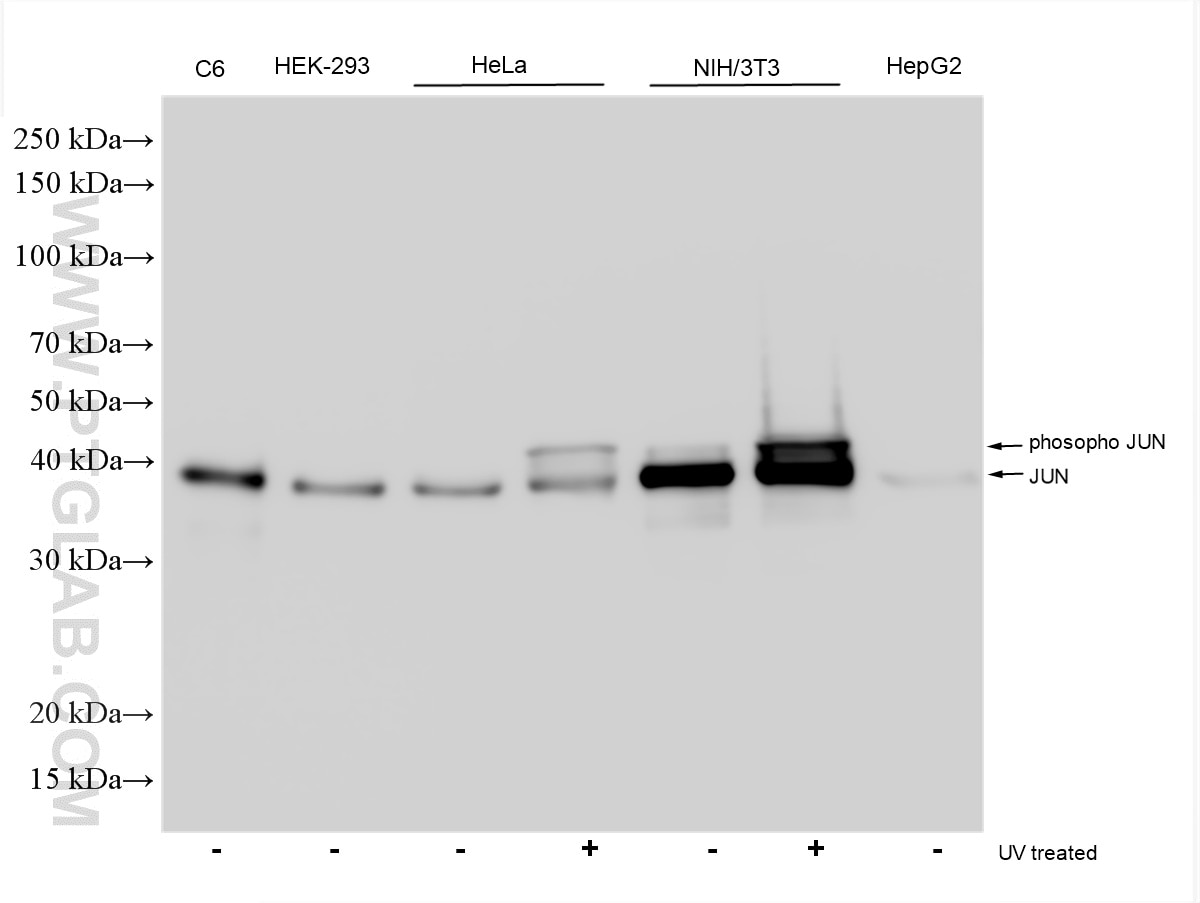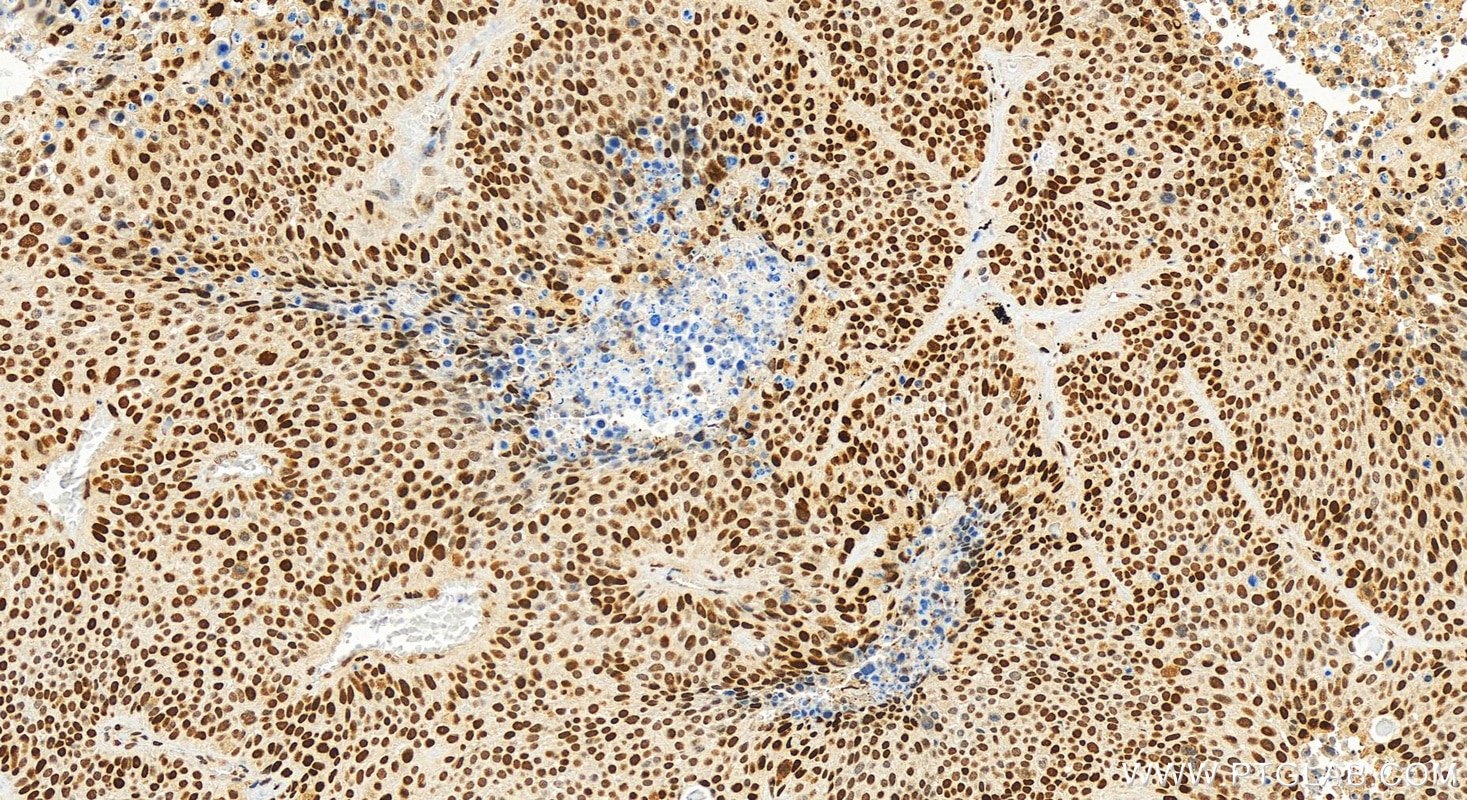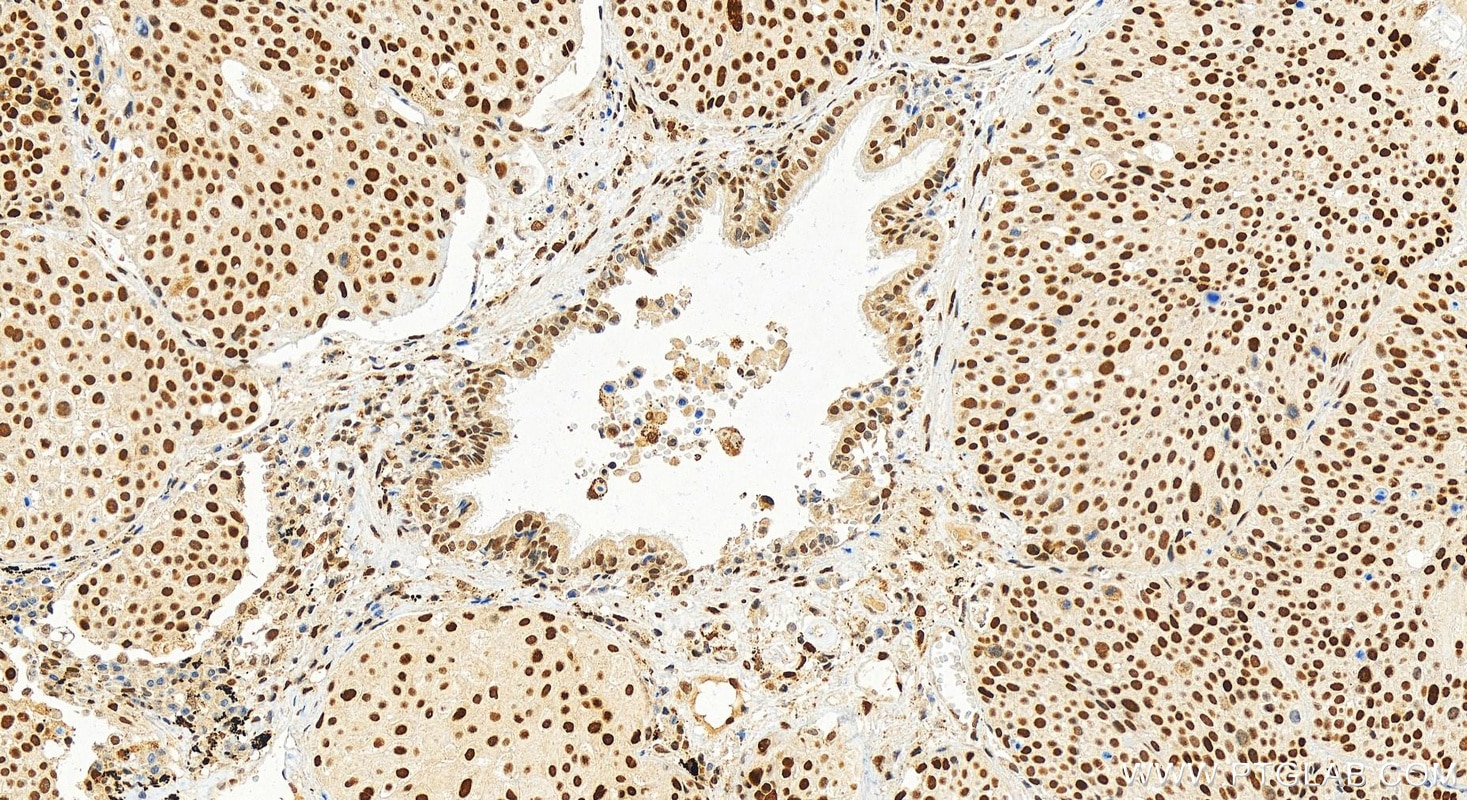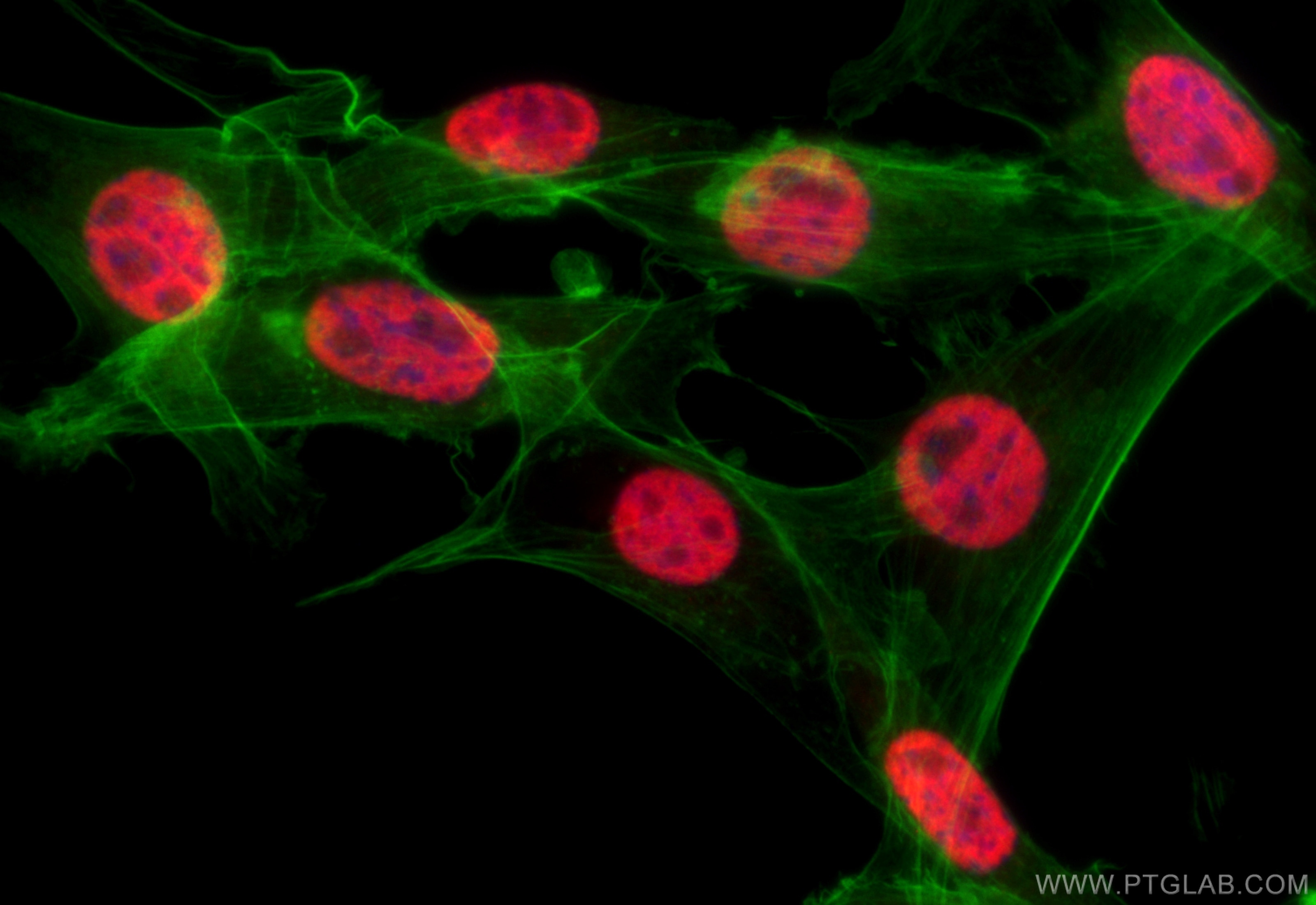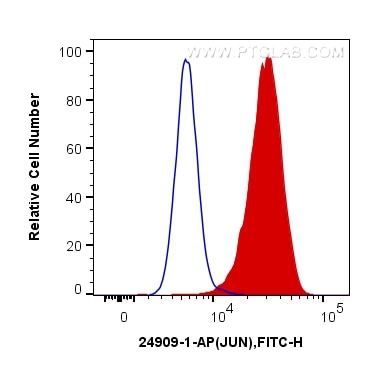- Featured Product
- KD/KO Validated
JUN Polyklonaler Antikörper
JUN Polyklonal Antikörper für WB, IHC, IF/ICC, FC (Intra), ELISA
Wirt / Isotyp
Kaninchen / IgG
Getestete Reaktivität
hamster, human, Maus und mehr (2)
Anwendung
WB, IHC, IF/ICC, FC (Intra), IP, CoIP, ChIP, ELISA
Konjugation
Unkonjugiert
Kat-Nr. : 24909-1-AP
Synonyme
Geprüfte Anwendungen
| Erfolgreiche Detektion in WB | UV treated HeLa cells, C6-Zellen, HEK-293-Zellen, HeLa-Zellen, HepG2-Zellen, NIH/3T3-Zellen, Mit UV behandelte NIH/3T3-Zellen |
| Erfolgreiche Detektion in IHC | human lung squamous cell cancer Hinweis: Antigendemaskierung mit TE-Puffer pH 9,0 empfohlen. (*) Wahlweise kann die Antigendemaskierung auch mit Citratpuffer pH 6,0 erfolgen. |
| Erfolgreiche Detektion in IF/ICC | NIH/3T3-Zellen |
| Erfolgreiche Detektion in FC (Intra) | NIH/3T3-Zellen |
Empfohlene Verdünnung
| Anwendung | Verdünnung |
|---|---|
| Western Blot (WB) | WB : 1:1000-1:6000 |
| Immunhistochemie (IHC) | IHC : 1:500-1:2000 |
| Immunfluoreszenz (IF)/ICC | IF/ICC : 1:50-1:500 |
| Durchflusszytometrie (FC) (INTRA) | FC (INTRA) : 0.20 ug per 10^6 cells in a 100 µl suspension |
| It is recommended that this reagent should be titrated in each testing system to obtain optimal results. | |
| Sample-dependent, check data in validation data gallery | |
Veröffentlichte Anwendungen
| KD/KO | See 4 publications below |
| WB | See 80 publications below |
| IHC | See 6 publications below |
| IF | See 17 publications below |
| IP | See 3 publications below |
| CoIP | See 2 publications below |
| ChIP | See 5 publications below |
Produktinformation
24909-1-AP bindet in WB, IHC, IF/ICC, FC (Intra), IP, CoIP, ChIP, ELISA JUN und zeigt Reaktivität mit hamster, human, Maus
| Getestete Reaktivität | hamster, human, Maus |
| In Publikationen genannte Reaktivität | human, Huhn, Maus, Ratte |
| Wirt / Isotyp | Kaninchen / IgG |
| Klonalität | Polyklonal |
| Typ | Antikörper |
| Immunogen | JUN fusion protein Ag17639 |
| Vollständiger Name | jun oncogene |
| Berechnetes Molekulargewicht | 331 aa, 36 kDa |
| Beobachtetes Molekulargewicht | 39 kDa |
| GenBank-Zugangsnummer | BC068522 |
| Gene symbol | JUN |
| Gene ID (NCBI) | 3725 |
| Konjugation | Unkonjugiert |
| Form | Liquid |
| Reinigungsmethode | Antigen-Affinitätsreinigung |
| Lagerungspuffer | PBS with 0.02% sodium azide and 50% glycerol |
| Lagerungsbedingungen | Bei -20°C lagern. Nach dem Versand ein Jahr lang stabil Aliquotieren ist bei -20oC Lagerung nicht notwendig. 20ul Größen enthalten 0,1% BSA. |
Hintergrundinformationen
JUN is also named as c-Jun and AP1, belongs to the bZIP family and Jun subfamily. JUN, the most extensively studied protein of the activator protein-1 (AP-1) complex, is involved in numerous cell activities, such as proliferation, apoptosis, survival, tumorigenesis and tissue morphogenesis[PMID: 22180088]. JUN is a transcription factor that recognizes and binds to the enhancer heptamer motif 5'-TGA[CG]TCA-3'. It promotes activity of NR5A1 when phosphorylated by HIPK3 leading to increased steroidogenic gene expression upon cAMP signaling pathway stimulation. JUN is a basic leucine zipper (bZIP) transcription factor that acts as homo- or heterodimer, binding to DNA and regulating gene transcription[PMID: 9732876]. In additon, extracellular signals can induce post-translational modifications of JUN, resulting in altered transcriptional activity and target gene expression[PMID:8464713]. More over, it has uncovered multiple layers of a complex regulatory scheme in which JUN is able to crosstalk, amplify and integrate different signals for tissue development and disease. Jun is predominantly nuclear, ubiquitinated Jun colocalizes with lysosomal proteins[PMID: 15469925]. This antibody is a rabbit polyclonal antibody raised against a region of human JUN. Both phosphorylated (p-c-Jun) and unphosphorylated forms of c-Jun, with sizes of 42-45 kDa and 36-39 kDa, respectively are obtain in some experiments. (PMID: 17210646)
Protokolle
| PRODUKTSPEZIFISCHE PROTOKOLLE | |
|---|---|
| WB protocol for JUN antibody 24909-1-AP | Protokoll herunterladen |
| IHC protocol for JUN antibody 24909-1-AP | Protokoll herunterladenl |
| IF protocol for JUN antibody 24909-1-AP | Protokoll herunterladen |
| STANDARD-PROTOKOLLE | |
|---|---|
| Klicken Sie hier, um unsere Standardprotokolle anzuzeigen |
Publikationen
| Species | Application | Title |
|---|---|---|
Cell Metab CircACC1 Regulates Assembly and Activation of AMPK Complex under Metabolic Stress.
| ||
Cell Host Microbe Veillonella intestinal colonization promotes C. difficile infection in Crohn's disease | ||
Biomaterials Material-driven immunomodulation and ECM remodeling reverse pulmonary fibrosis by local delivery of stem cell-laden microcapsules | ||
Nat Commun Proteomic profiling and genome-wide mapping of O-GlcNAc chromatin-associated proteins reveal an O-GlcNAc-regulated genotoxic stress response. | ||
Nat Commun TNF antagonist sensitizes synovial fibroblasts to ferroptotic cell death in collagen-induced arthritis mouse models. |
